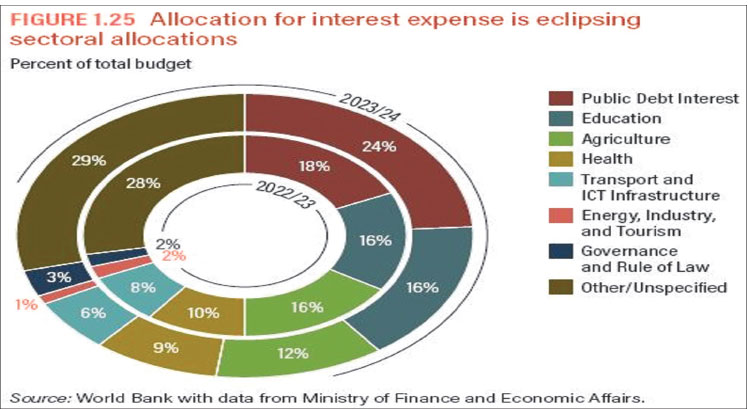Malawi misses out on Debt service suspension
Despite being eligible for the debt service suspension initiative (DSSI), Malawi alongside 29 other debt-distressed economies failed to benefit from the programme.
DSSI is a programme that was meant to defer official debt service due to poor countries, which was extended through the end of 2021.
Malawi, despite making requests for DSSI, did not participate, according to the findings by the China-Africa Research Initiative.
In its briefing paper titled ‘Integrating China into Multilateral Debt Relief: Progress and Problems in the G20 DSSI’, China-Africa Research Initiative said the failure to participate may be due to concerns for their countries’ credit ratings and future borrowing.
Reads the paper in part: “In eight of the 30 countries, debt held by China bilateral creditor[s] mainly China Eximbank is larger than the private debt. The eight countries are Cambodia, Guyana, Laos, Liberia, Malawi, Tajikistan, Uganda and Vanuatu.

“Malawi is now in debt distress while Laos and Tajikistan are at high risk of distress. It is not clear if China Eximbank dissuaded them from participating in the DSSI.”
On March 25 2020, as the Covid-19 pandemic swept across the world, the heads of the International Monetary Fund (IMF) and the World Bank proposed that the leaders of the world’s 20 largest economies, the Group of 20 (G20), provide breathing space by suspending the collection of debt service on official loans to 73 of the world’s poorest countries.
The G20 then launched DSSI on April 15 2020.
Although bickering ensued about full participation among the primary official creditors and non-participation among private creditors, the DSSI provided $6 billion of relief during 2020 and another $7 billion in 2021 for the 48 countries that signed up.
In an interview on Tuesday, Malawi University of Business and Applied Sciences associate professor of economics Betchani Tchereni said the aspect of debt restructuring is the one that would be good for the economy.
He said: “Where such restructuring fails to be achieved will mean a lot of economic challenges for Malawi. For example, Malawi may fail to get some donor assistance as it may be regarded as in debt distress.”
Debt restructuring is key to deliver the Extended Credit Facility (ECF), as such, Malawi is making a number of efforts to have some of its debt restructured. Part of the restructuring will involve asking for debt relief, however this is a huge fit to be passed.
Besides owing India about $136 million (about K150 billion), Malawi owes Afreximbank about $757 million (about K830 billion) in foreign debt and about $145 million (about K160 billion) is owed to Trade and Development Bank formerly PTA Bank. There are also millions of dollars in arrears.
Through its Exim Bank, China is the largest bilateral creditor to Malawi and the third among external financiers, accounting for roughly $218 million (about K240 billion) or 8.34 percent of the foreign loans that the Malawi Government has contracted.
The World Bank, through the International Development Association, remains the largest creditor, constituting nearly $1.3 billion or 47.61 percent of the external debt stock followed by the African Development Bank through the African Development Fund with $420 million or equivalent to 16.10 percent of Malawi’s foreign loans.
Minister of Finance and Economic Affairs Sosten Gwengwe was yet to respond to our questions by press time at midday yesterday.
However, in an earlier interview, he said if Malawi is able to restructure the debt, Treasury will be able to create more fiscal space and have more resources allocated towards productive and development sectors.
In September last year, President Lazarus Chakwera’s administration pushed for a four-pronged strategy to bring down the crippling loans to manageable levels. This included returning to multilateral and bilateral creditors to negotiate debt relief.






Ambalaj SepetimMikrodalga yemek kapları,Sızdırmaz kaplar,Çorba kase ve kapaklar,Suşhi yemek kabı,Şamua kese kağıdı ,Yağlı kese kağıdı ,Dürüm kese kağıdı ,Kagit çantalar,Hamburger kutuları ,Fast food kutuları,Pipetler,Peçete ve mendiller,Gıda eldiveni,Doypack kilitli posetler
Kes – Mak Bahçe Aksesuarları ve Yedek Parça | Malatya kesmak, kes-mak malatya, malatya kes-mak, motorlu testere yedek parça,Malatya Stihl Bayi, benzinli testere yedek parça, testere zinciri, ağaç kesme pala, klavuz, elektronik bobin, hava filtresi, stihl malatya bayi, stihlmalatya,malatyastihl, stihl servisi, malatya stihl servis, malatya testere,malatyastihlbayi, stihl malatya, malatya stihl, stihl bayisi malatya, Hekimhan stihl bayi, malatya testere bayisi, malatya stihl servis, stihl malatya servis,